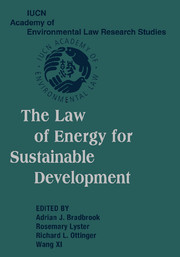Book contents
- Frontmatter
- Contents
- Acknowledgments
- Message from Kofi A. Annan, Secretary-General, United Nations
- Introduction – A Global Learned Society to Address Earth's Evolution: The IUCN Academy of Environmental Law
- Public Lectures on International Environmental Law
- PART ONE SUSTAINABLE DEVELOPMENT AND THE ROLE OF ENERGY LAW
- PART TWO LEGAL ISSUES IN CONTEMPORARY ENERGY LAW
- 7 Legal Frameworks for Energy for Sustainable Development
- 8 Air Pollution Control Laws: Common but Differentiated Responsibilities for Managing the Atmosphere
- 9 Green Pricing and Green Power Marketing: Demand-Side Mechanisms for Promoting “Green Power” in Deregulated Energy Markets
- 10 Agricultural Renewable Energy and Its Management in China
- PART THREE INTERNATIONAL ENERGY LAW
- PART FOUR COMPARATIVE ENERGY LAW
- PART FIVE ELECTRICITY RESTRUCTURING
- PART SIX FINANCING FOR SUSTAINABLE ENERGY
- PART SEVEN CIVIL SOCIETY AND THE PROCEDURAL REQUIREMENTS OF ENERGY LAW FOR SUSTAINABLE DEVELOPMENT
- Index
8 - Air Pollution Control Laws: Common but Differentiated Responsibilities for Managing the Atmosphere
Published online by Cambridge University Press: 10 August 2009
- Frontmatter
- Contents
- Acknowledgments
- Message from Kofi A. Annan, Secretary-General, United Nations
- Introduction – A Global Learned Society to Address Earth's Evolution: The IUCN Academy of Environmental Law
- Public Lectures on International Environmental Law
- PART ONE SUSTAINABLE DEVELOPMENT AND THE ROLE OF ENERGY LAW
- PART TWO LEGAL ISSUES IN CONTEMPORARY ENERGY LAW
- 7 Legal Frameworks for Energy for Sustainable Development
- 8 Air Pollution Control Laws: Common but Differentiated Responsibilities for Managing the Atmosphere
- 9 Green Pricing and Green Power Marketing: Demand-Side Mechanisms for Promoting “Green Power” in Deregulated Energy Markets
- 10 Agricultural Renewable Energy and Its Management in China
- PART THREE INTERNATIONAL ENERGY LAW
- PART FOUR COMPARATIVE ENERGY LAW
- PART FIVE ELECTRICITY RESTRUCTURING
- PART SIX FINANCING FOR SUSTAINABLE ENERGY
- PART SEVEN CIVIL SOCIETY AND THE PROCEDURAL REQUIREMENTS OF ENERGY LAW FOR SUSTAINABLE DEVELOPMENT
- Index
Summary
INTRODUCTION
Energy law does not function in a vacuum. All energy production entails environmental impacts. The burning of carbon fuels and biomass produces greenhouse gases, with their attendant global implications for climate change, and at the same time produces air pollution, which harms the health of persons locally and contributes to tranboundary air pollution problems such as “acid rain” or the “atmospheric brown cloud” (ABC) phenomena. Although national governments currently only make halting progress at best when addressing emission of greenhouse gases, their national laws to control air pollution are marked with some success. Experience with successful air pollution control systems in some nations provides guidance for how all nations can meet their common responsibility to protect the public health from poisonous air pollution.
While addressing their duty to abate air pollution, nations also can make a major and common contribution to reducing greenhouse gas emissions. Despite contemporary political stalemates over the adherence by the Russian Federation or the United States of America to the Kyoto Protocol, much progress on reducing carbon dioxide emissions can be made in the course of enhancing the effectiveness of air pollution laws. Those who debate climate change have tended to devote rather too little attention to how the experience gained in abating pollution of the atmosphere can be applied to reducing greenhouse gas emissions.
Air pollution is a significant health hazard in most large cities around the world.
- Type
- Chapter
- Information
- The Law of Energy for Sustainable Development , pp. 124 - 137Publisher: Cambridge University PressPrint publication year: 2005
- 1
- Cited by

